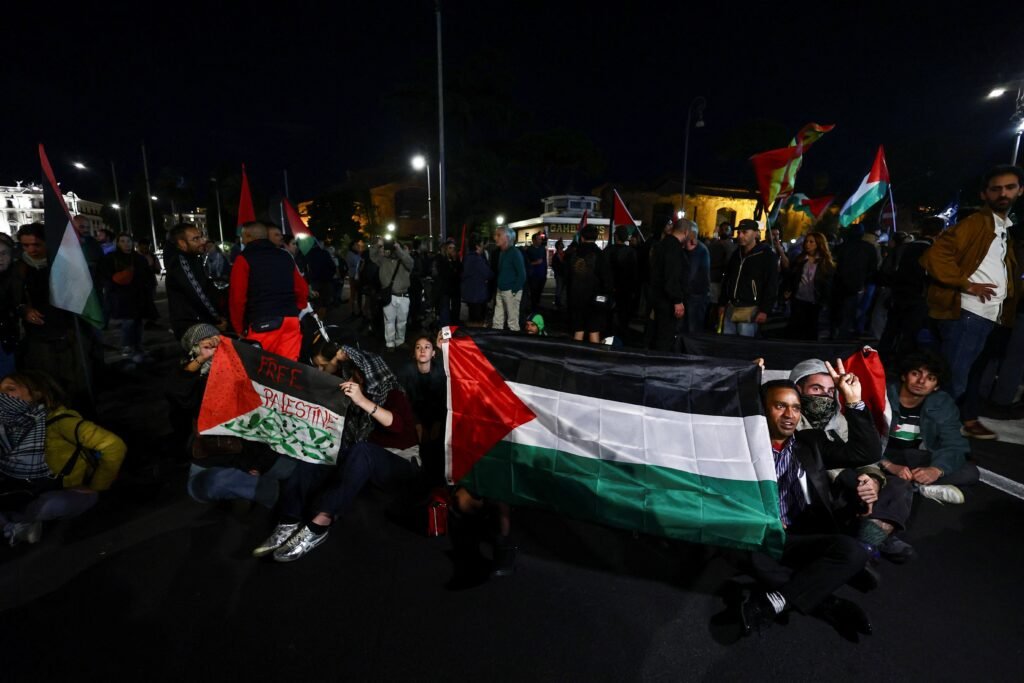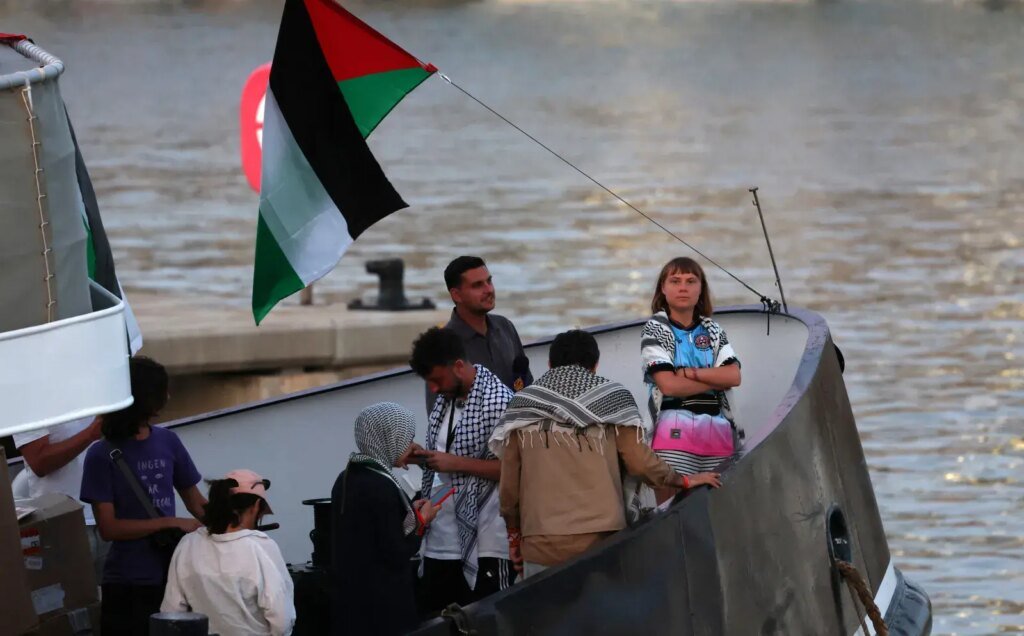JERUSALEM (AP) — The Israeli interception of a Gaza-bound flotilla carrying humanitarian aid and hundreds of activists raises questions about what any nation can legally do to enforce a blockade in international waters.
As dozens of boats sailed closer to Gaza on Wednesday afternoon, the Israeli navy warned them to turn back.
“You are entering an active war zone. If you continue and attempt to break the naval blockade, we will stop your vessel,” a member of the Israeli navy told the activists via radio. Then Israeli military personnel stormed the vessels and seized activists, including Greta Thunberg, Nelson Mandela’s grandson and several European lawmakers.
The Israeli action sparked condemnation from world leaders and human rights groups who say Israel violated international law.
This combination of images released by the Israeli Foreign Ministry shows Greta Thunberg, second from right, with other flotilla activists after the Israeli navy intercepted the Global Sumud Flotilla carrying humanitarian aid to Gaza, Wednesday, Oct. 1, 2025. (Israeli Foreign Ministry via AP)
This combination of images released by the Israeli Foreign Ministry shows Greta Thunberg, second from right, with other flotilla activists after the Israeli navy intercepted the Global Sumud Flotilla carrying humanitarian aid to Gaza, Wednesday, Oct. 1, 2025. (Israeli Foreign Ministry via AP)
A humanitarian mission
The activists say their nonviolent, civilian mission is lawful. Though they carried only a symbolic amount of aid, including baby formula, food and medical supplies, their goal, they say, is to establish a humanitarian corridor to facilitate the flow of aid into famine-stricken Gaza.
Israeli and European government officials had offered alternatives for the flotilla to transfer its aid to the Palestinian territory, which the activists rejected citing Israel’s tight control on all that enters Gaza.
Defending their mission, flotilla activist and spokesperson Thiago Ávila cited a provisional International Court of Justice ruling that ordered Israel to “take immediate and effective measures to enable the provision of urgently needed basic services and humanitarian assistance to address the adverse conditions of life faced by Palestinians in the Gaza Strip.”
“You are not allowed by international law to stop us. Therefore we do not comply with your request,” he told the navy via radio shortly before the interceptions began some 70 nautical miles (130 kilometers) from the shores of Israel and Gaza.
Only one boat appears to have crossed the 12-nautical-mile line (22-kilometer line) marking territorial waters off Gaza.
A Gaza-bound Sumud flotilla boat is escorted into the port of Ashdod, Israel, Thursday, Oct. 2, 2025, after being intercepted while approaching the Gaza coast by Israeli navy soldiers. (AP Photo/Leo Correa)
A Gaza-bound Sumud flotilla boat is escorted into the port of Ashdod, Israel, Thursday, Oct. 2, 2025, after being intercepted while approaching the Gaza coast by Israeli navy soldiers. (AP Photo/Leo Correa)
Interception in international waters
The U.N. Convention on the Law of the Sea stipulates that a nation’s territory does not extend beyond 12 nautical miles (19 kilometers) from its shores. It says authorities may exercise control up to 24 nautical miles (45 kilometers) from land to prevent violation of customs, immigration, fiscal or sanitary laws.
Robbie Sabel, an international law expert and former legal adviser to the Israeli Foreign Ministry, said states generally don’t have the right to seize ships in international waters, though there are exceptions, including during armed conflict.
Even before the latest war, Israel was in an armed conflict with Hamas, Sabel said, allowing it to intercept ships it suspected violated its longstanding blockade of Gaza. Rights groups have long criticized the blockade as the unlawful punishment of Palestinians.
A contentious maritime blockade
Yuval Shany, an expert on international law at Hebrew University in Jerusalem, said as long as Israel’s blockade of Gaza is “militarily justified” to keep out weapons and the ship intended to break it, Israel can intercept the vessel after prior warning.
The debate over the legality of Israel’s blockade remains a point of contention.
Adalah, a legal rights group in Israel representing the activists, said in a statement that “the abduction of peaceful civilians in international waters, constitutes a brazen violation of international law.”
Omer Shatz, an Israeli international law expert who teaches at Sciences Po University in Paris and co-litigated a previous flotilla case before the Supreme Court of Israel, told The Associated Press that even if the disputed siege of Gaza was considered lawful, “international law paves a humanitarian road from the high seas to Gaza,” he said.
“If the basic needs of the population are not provided by the occupying power, there is a right to provide humanitarian aid, albeit under certain conditions,” Shatz said. Israel has the right to board and search the vessels to verify the cargo, as it does with aid trucks crossing into Gaza by land.
A protester waves a Palestinian flag in support of the the Global Sumud Flotilla as it arrives at the port of Sidi Bou Saïd, in Tunis, Tunisia, Sunday, Sept. 7, 2025. (AP Photo/Anis Mili)
A protester waves a Palestinian flag in support of the the Global Sumud Flotilla as it arrives at the port of Sidi Bou Saïd, in Tunis, Tunisia, Sunday, Sept. 7, 2025. (AP Photo/Anis Mili)
Enforcing international maritime law
It’s not the first time Israel has halted and confiscated humanitarian ships bound for Gaza. Dozens of boats have attempted to reach the Palestinian territory in the past two decades, but none has reached it since 2008.
In 2010, an Israeli commando raid on the Mavi Marmara flotilla descended into violence. Eight Turkish activists and one Turkish-American were killed.
A subsequent U.N. report acknowledged “attempts to breach a lawfully imposed naval blockade place the vessel and those on board at risk,” while also urging member states to be cautious in using force against civilian vessels. It called on humanitarian missions to deliver aid through regular channels and said a country’s naval blockade “must abide by their obligations with respect to the provision of humanitarian assistance.”
Enforcing international maritime law is a challenge across the globe. Generally, only states can take other states to court for violations of the U.N. Convention for the Laws of the Sea. But there are other legal frameworks and mechanisms individuals can use to seek justice, including those their state flags are party to. For example, Israel forcibly removing people from foreign-flagged vessels in international waters and taking them to Israel could be considered a crime, Shatz said.
The state prosecutors’ office of Spain told The Associated Press on Thursday that it will gather information on the flotilla interception as part of its ongoing effort to collect evidence of possible human rights violations by Israel to be presented in international courts.
Activists meanwhile say they will continue to attempt to break the Israeli blockade by sea.
A second flotilla of ships formed by The Freedom Flotilla Coalition and Thousand Madleens to Gaza is already on its way after departing Italy last week.
___
Brito reported from Barcelona, Spain. Tia Goldenberg in Washington, D.C., and Joseph Wilson in Barcelona contributed.








